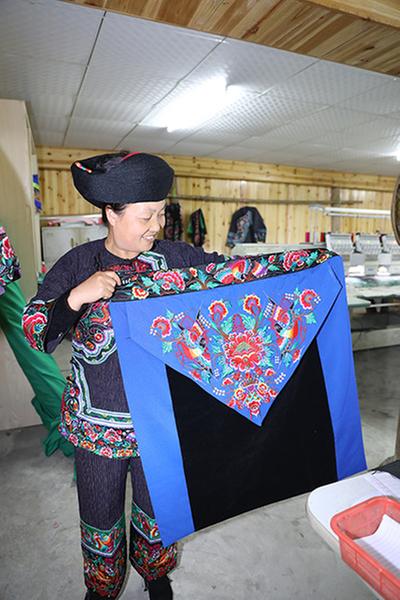Traditional attire helps Miao women earn a living
By Liu Xiangrui in Huayuan, Hunan | China Daily | Updated: 2017-07-14 09:20
 |
| Ma Meiying works on an embroidery machine in Huayuan county, Hunan province. She leads her people to make traditional dresses of the Miao ethnic group. LIU XIANGRUI/CHINA DAILY |
After the cooperative was started, she bought another machine to expand the scale.
According to Ma, one of the challenges for her was finding enough skilled workers, especially those who can operate the machine and the computer.
"The villagers have to do farm work, take care of housework and children. They have very limited time to work at the cooperative, which requires time and training," Ma says.
She adds that the workers have limited knowledge about computers. When the computer or embroidery machine breaks down, they dare not to touch them and have to wait for her to resolve the problem.
"So when I am not here, the workshop usually has to close, too," Ma says.
Ma is the only one who knows how to make embroidery plates on the computer in the cooperative. She designs the patterns herself according to traditional images in Miao culture.
Now, Ma provides free training to the cooperative members and anyone who is willing to learn the skills.
Shi Guiying, 43, is one of the members who joined the cooperative this year. After receiving training, she earns about 600 yuan in a good month. A few full-time workers get paid 1,700 yuan a month.
"It's good to have such an opportunity to earn more money without having to leave the village," Shi says.
According to Shi, many of the women are aged above 40, and they do the work only during their free time.
Ma says she will continue to expand the cooperative and is willing to take in any woman who wants to join them.
As their cooperative gradually becomes famous, many local villagers and vendors have come directly to their village to buy their products.
Last year, the cooperative was able to sell nearly 500 machine-made dresses - for 500 yuan each.
In the first half of this year, they sold 12 hand-made dresses - each taking a worker about three months to complete and costing more than 3,000 yuan - to a local performance group. Another 200 machine-made dresses were sold, too.
"The business will get even better in winter, because it's the slack farming season and many events will take place during that time," Ma says.
"If everything goes well and we have enough orders, we can open a factory and provide the villagers with stable jobs, so they can earn steady incomes without having to work away from home."
While the cooperative still focuses on the traditional products because the demand is high, it has also been looking to diversify through combining ethnic elements with fashion designs to cater to a bigger market.
The cooperative is also producing daily-use items, such as tablecloth and pillow covers with decorative Miao patterns and even wedding gowns.
Some samples have been ordered by a customer from Beijing, who is interested in promoting such products in big cities.
"If they are satisfied with our products, we will get more orders in the future," Ma says.
























